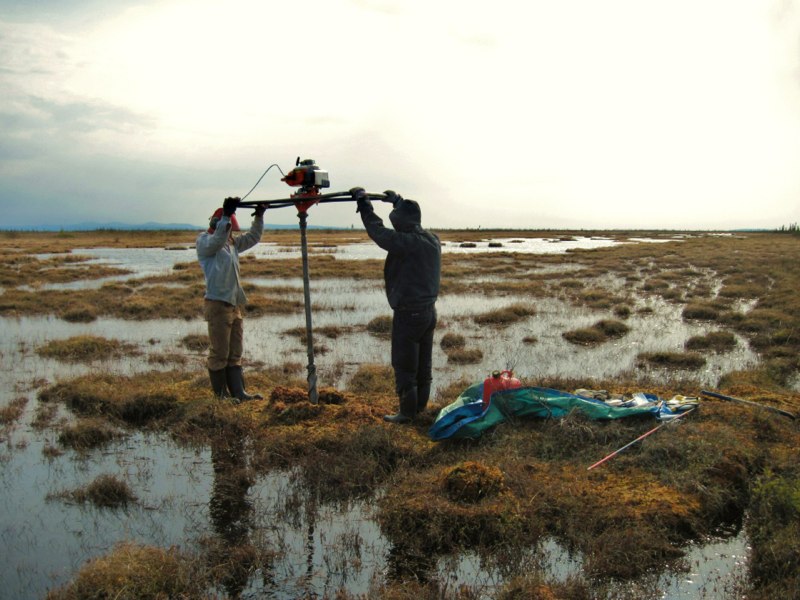
Zoë Braul and Ashlyn Frost extracting a permafrost core from a drained lake basin, Old Crow Flats, YT. (June 2010, Pascale Roy-Léveillée
Travel and Health Insurance
It is important for all members of a field work team to identify if they have sufficient travel and health insurance, including specific coverage for emergency evacuation. Insurance and coverage levels differ for Carleton faculty members, students, and researchers who are not affiliated with Carleton University. The following is a list of considerations for determining if you have adequate coverage, or for acquiring the additional coverage needed. This is important to identify and act upon well in advance of any field work, and should be one of the considerations included when completing the Field Safety Form.
What is required?
You need coverage in the event of a medical emergency so that transportation costs can be recouped. This includes emergency medical evacuation and repatriation of remains. For example, a Twin Otter flight to Northern Ellesmere Island from Resolute, Nunavut (and return) is 8 hrs (about $20,000), so somebody must pay for this if it needs to happen.
Who is covered?
Faculty and staff
All Carleton University faculty and staff members who are enrolled in the Extended Health Care Plan are covered for Emergency Out of Country medical assistance (Global Medical Assistance). Casual staff are not enrolled in this plan. Coverage begins 500 km from your home and extends globally. This coverage includes evacuation from a remote area to the nearest adequate medical facility. Note that ‘out of country’ also applies to ‘out-of-province’ except that in that case, some costs, like air ambulance, are only reimbursable to 80%. 24 hour emergency assistance telephone numbers are found on the back of your drug card.
Graduate students
Carleton University graduate students are covered for up to one month of travel. See GSA Health and Dental Insurance plans (Travel Insurance – Emergency Medical section).
Other personnel
Other personnel may include summer students, non-Carleton employees, etc. For these research team members to be adequately covered, they will need to purchase private insurance. Coverage amounts should be sufficient to cover evacuation (plus possibly attempts). Deductible can be reasonably high (about $1000) if this is an option.
Checklist
✓Start well before your anticipated travel
✓Determine what category you are in (above)
✓Check to make sure that you are eligible for the plan (pre-existing conditions?)
✓Make sure you read and understand the policy – talk to a representative if required and get answers in writing!
✓Be aware of the start and end dates of your coverage. Know how to extend coverage if required and consider buying a bit extra in case of delays.
✓Save the receipt for reimbursement
✓Review the process for making a claim and initializing an evacuation
✓Write down the contact information for the ‘helpline’ so you don’t need to hunt for this when you need pre-approval. This information should be:
- In your fieldbook
- On the field safety form
- On file with your primary emergency contacts (e.g. PCSP, the Amundsen, local RCMP office, northern research institute, family members, or similar)
- Don’t dwell on this too much. You are covered. Be safe and have a good time.
Recommendations
Over the years the Northern Research Committee Chair has compiled a list of preferred insurance companies used by faculty and students conducting northern research. If you would like to receive specific recommendations for evaluation or other specialized insurance coverage options please contact the Northern Research Committee Chair directly.
Environmental Liability Insurance
Carleton University also has insurance for pollution liability. This coverage does not have any territorial limit, however, losses/incidents (e.g., fuel spills) must be reported within 3 days of the start of the incident. Please contact Tony Lackey (Tony.Lackey@carleton.ca) to report an incident ASAP, as well as the authorities (e.g., Fuel Spill Hotline, etc).